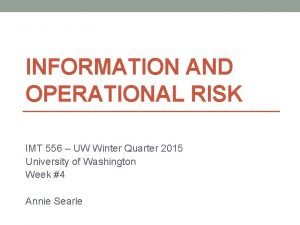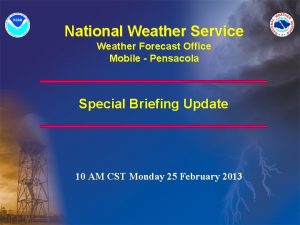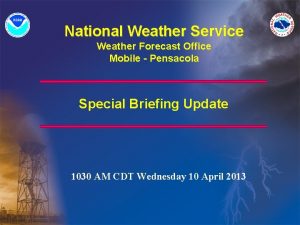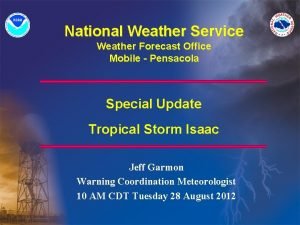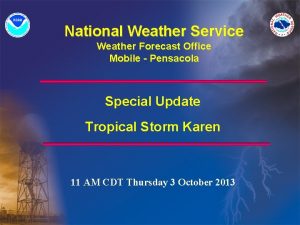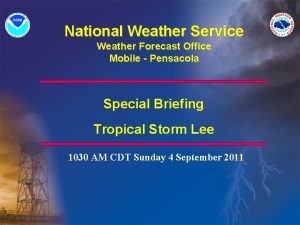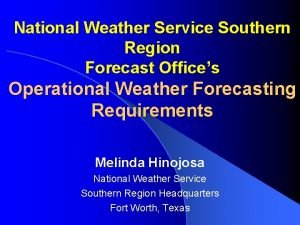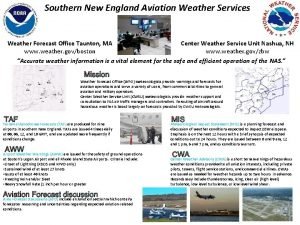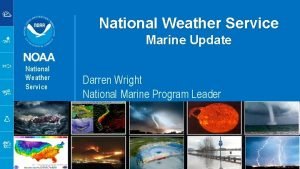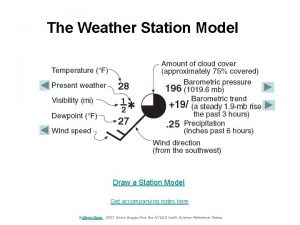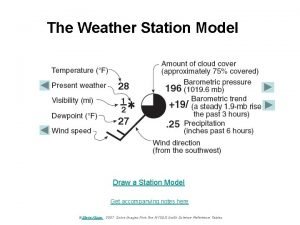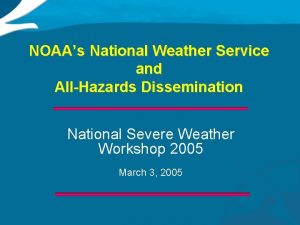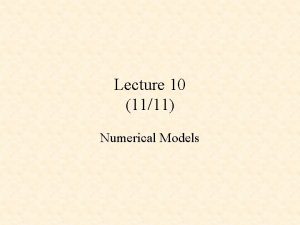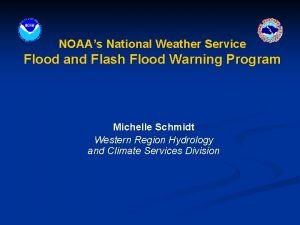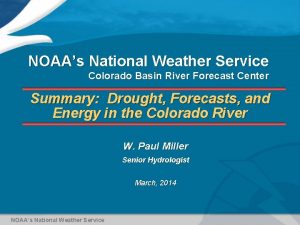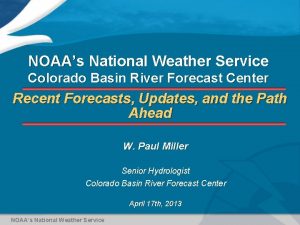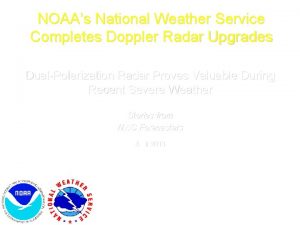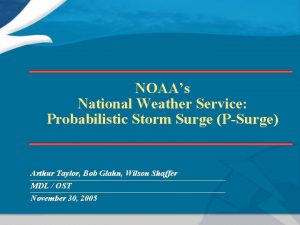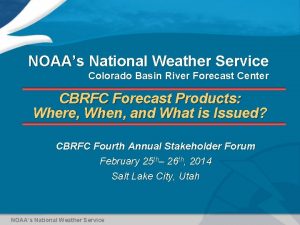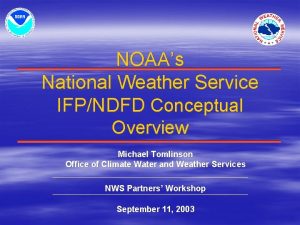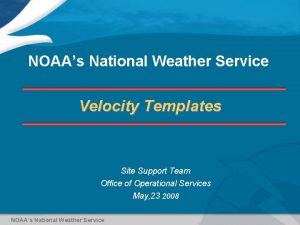NOAAs National Weather Service APPLICATION OF NUMERICAL MODELS












- Slides: 12

NOAA’s National Weather Service APPLICATION OF NUMERICAL MODELS IN THE FORECAST PROCESS FROM NATIONAL CENTERS TO THE LOCAL WFO David W. Reynolds National Weather Service WFO San Francisco Bay Area Monterey, CA 50 th Anniversary of Operational Numerical Weather Prediction June 17, 2004 NOAA’s National Weather Service

Models and Forecasters • Focus talk on T+12 hrs and beyond • For these valid times the forecaster is heavily dependent on numerical model guidance. • Major paradigm shift is taking place in how forecasts are being prepared at local WFOs. • Have transitioned from forecaster spending several hours reviewing model output then manually preparing text forecasts to nudging an existing digital forecast database toward a new collaborated model solution, “drawing the forecast. ” • National Centers made significant paradigm shift several years ago when transitioning from acetate and grease pencils to digital product creation. • NCEP service centers very often initiate guidance forecast from new model guidance – the forecast challenge is picking the “right” model and value adding by knowing how to adjust for model biases. 50 th Anniversary of Numerical Modeling

Models and Forecasters • Where do forecasters add value? • A difficult question and hard to find good objective quantifiable data, especially related to sensible weather parameters. • Long standing QPF data shows forecasters can add value. Equivalent to 10 -15 years of model development. 50 th Anniversary of Numerical Modeling

Models and Forecasters • Current QPF process in NWS shows value added in each step of the forecast process. • However uncertainty still large. Migrate from deterministic to probabilistic. • USWRP supported 50 th Anniversary of Numerical Modeling

Models and Forecasters • For other manual forecast parameters such as medium range surface pressure it becomes more problematic to determine forecaster contributions. • Relates to forecast uncertainty. • Begs the question of the role of the forecaster when uncertainty is high. • Deterministic versus probabilistic forecasts. 50 th Anniversary of Numerical Modeling

Models and Forecasters • UKMET office does show some skill in days 3 and 4 utilizing special software package called On. Screen Field Modification that allows a four dimensional adjustment of model output through manipulation of surface pressure features. 50 th Anniversary of Numerical Modeling

Models and Forecasters – The Future • Interactive Forecast Preparation System – the new paradigm. Paper by Ruth to follow. • 2. 5 or 5 km gridded forecasts at 1, 3, 6, or 12 hour temporal frequency of sensible weather, wave heights out through day 7. • Formatters used to generate text forecasts from the grids. 50 th Anniversary of Numerical Modeling

Models and Forecasters – The Future • More dependence now on statistically post processed model output then before (MOS). • Model biases in 2 m temperatures, dewpoints, and inability to obtain raw model output consistent with grid resolution (2. 5 -5 km). • Shear workload of populating the large number of grids required questions how relevant the forecaster will be in the gridded forecast process. • Forecasters coping with workload but no reliable measure of forecast quality. Lack of “analysis of record” at 2. 5 or 5 km. • Grids deterministic implying accuracy. No uncertainty provided to the customer. 50 th Anniversary of Numerical Modeling

Models and Forecasters – The Future • No gridded verification to date. • Utilization of point verification would indicate little value being added by forecasters over MOS for most if not all parameters. • Must have a measure of uncertainty. 50 th Anniversary of Numerical Modeling

Models and Forecasters – The Future • How should we proceed? • Rapid expansion into short and medium range ensemble forecasting provides new opportunities. • Multi-model ensembles available from the WRF architecture and multi-model medium range ensembles (GFS and CMC) will provide the catalyst to move in a new direction. • Statistically post processed ensemble means and calibration of ensemble probabilities could provide the basis for populating the grids. • Ensemble means and downscaling methods could provide the expected value forecasts. (Jun Du) • Calibrated probabilities provide a reliable measure of uncertainty (probability density function). 50 th Anniversary of Numerical Modeling

Models and Forecasters – The Future • So how does the forecaster fit into this new picture both nationally and locally? • EMC and MDL prototype use of calibrated ensemble based forecasts and downscaling techniques to populate sensible weather grids (Test Bed). Parallel with the deterministic approach. Provides objective measure of uncertainty we can’t get from forecasters. – Hand off this methodology to WFOs who will QC grids locally. – WFOs primary function will be the interface with local partners and customers to educate on interpretation and application of output. • EMC and HPC begin testing methods to improve model forecasts of significant events via manual “intervention” in the assimilation cycle. – THORPEX provides an opportunity to test this concept. 50 th Anniversary of Numerical Modeling

Models and Forecasters – The Future • Intervention • Forecaster intervenes with data assimilation cycle during significant expected weather events in order to maintain critical observations in the forecast cycle. – Methodology has proven useful in MET office for major extratropical cyclones. – Applications for both west and east coast rapid cyclogenises. – Forecaster now adds value at the front end, not the back end, of the process. 50 th Anniversary of Numerical Modeling
 Imt 556
Imt 556 National weather service pensacola
National weather service pensacola Nws pensacola
Nws pensacola Nws mobile pensacola
Nws mobile pensacola National weather service pensacola
National weather service pensacola National weather service pensacola
National weather service pensacola National weather service
National weather service National weather service pensacola
National weather service pensacola Nws marine
Nws marine Modal and semi modal verbs
Modal and semi modal verbs Draw a station model
Draw a station model Station model weather symbols
Station model weather symbols Weather station model symbols
Weather station model symbols
